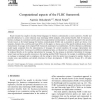Free Online Productivity Tools
i2Speak
i2Symbol
i2OCR
iTex2Img
iWeb2Print
iWeb2Shot
i2Type
iPdf2Split
iPdf2Merge
i2Bopomofo
i2Arabic
i2Style
i2Image
i2PDF
iLatex2Rtf
Sci2ools
137
click to vote
DSS
2002
2002
Computational aspects of the FLBC framework
Recent research has sought to develop formal languages for business communication as more expressive, flexible and powerful alternatives to current electronic data interchange (EDI) standards, with potential benefits both for business-tobusiness exchanges in e-commerce and for general intra-organizational communication. A prominent approach in this area has become known as the formal language for business communication (FLBC) and is grounded on speech act theory, event semantics, thematic roles, and first-order logic (FOL). In this paper, we discuss some of the specific technical choices for the representation of messages in the original FLBC framework and propose two modifications. The first eliminates a problematic modal logical component from the representations of messages; the second transforms the message representation into Skolemised clausal form. Focusing on two different computational tasks, we illustrate how existing computational methods can be employed directly on the res...
Related Content
| Added | 18 Dec 2010 |
| Updated | 29 Mar 2011 |
| Type | Journal |
| Year | 2002 |
| Where | DSS |
| Authors | Aspassia Daskalopulu, Marek J. Sergot |
Comments (0)



